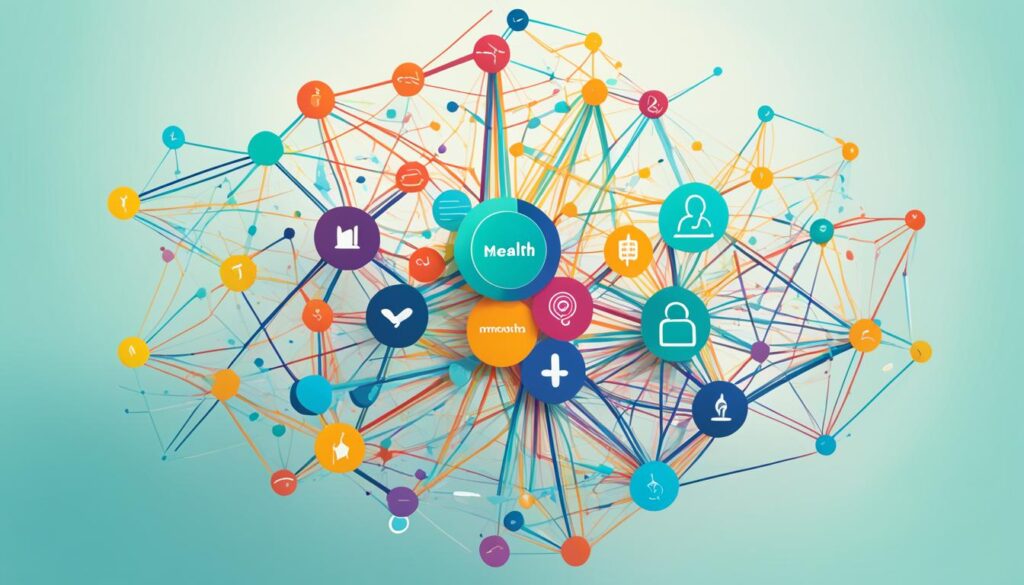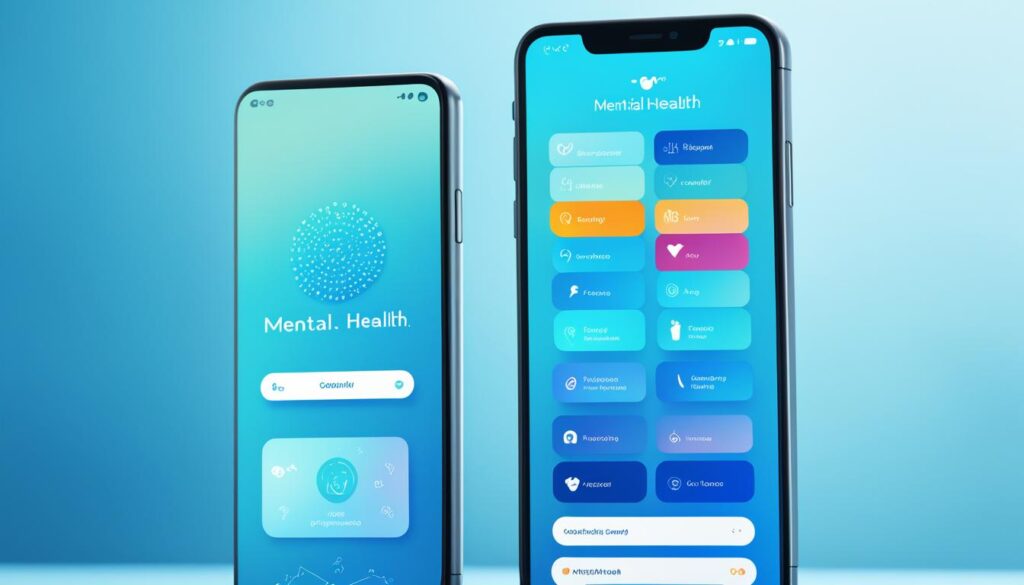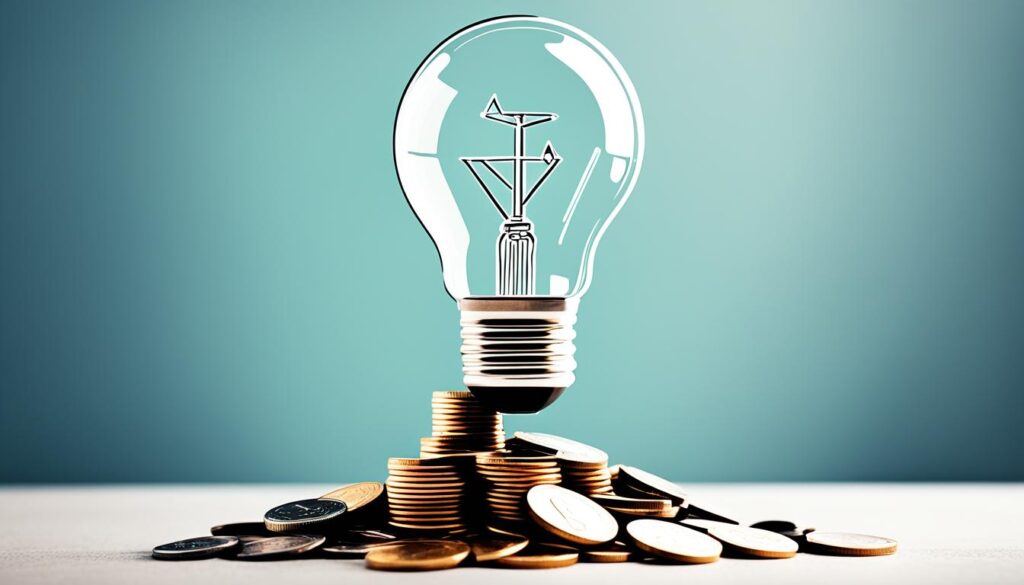Mental Health Apps Development
Did you know that the global mobile mental wellness apps market is projected to grow by 82.5 percent between 2020 and 2022, generating $491 million in consumer spending? The demand for mental health apps has skyrocketed due to the increasing mental health crisis aggravated by the COVID-19 pandemic. As more people seek solutions to manage their mental well-being, developers and experts are stepping up to create innovative and impactful mental health apps.
Key Takeaways:
- The global mobile mental wellness apps market is set to grow by 82.5 percent between 2020 and 2022.
- The COVID-19 pandemic has intensified the need for mental health apps.
- Mental health apps provide a platform for individuals to manage their mental health and improve their well-being.
- The development of mental health apps offers an opportunity to address the growing mental health crisis.
- Mental health apps are an accessible and convenient solution for individuals seeking mental health support.
Understanding Mental Health Apps
Mental health apps have become indispensable tools for individuals seeking to monitor their mental well-being and manage mental health disorders. With the global market for mental health apps projected to reach $17.5 billion by 2030, these applications offer a wide range of support for various mental health concerns, such as anxiety, depression, addiction recovery, and self-improvement.
The COVID-19 pandemic has further emphasized the importance of digital platforms in delivering mental health care and meeting the increasing demand for services. These apps provide accessible and convenient solutions, allowing users to seek support and guidance anytime, anywhere.
Let’s take a closer look at how mental health apps are transforming the way individuals approach mental wellness:
1. Self-Monitoring and Support
Mental health apps empower users to monitor their mental health on a regular basis. They provide tools and features that allow individuals to track their mood, sleep patterns, stress levels, and other relevant indicators. By gaining insights into their mental well-being, users can make informed decisions and take appropriate steps to maintain their mental health.
Furthermore, mental health apps offer valuable support and guidance to individuals. They provide resources such as educational materials, coping strategies, self-help techniques, and even access to support communities. These features can make a significant difference in empowering individuals to manage their mental health effectively.
2. Accessibility and Affordability
Mental health apps break down barriers to accessing mental health care. With just a few taps on their smartphones, users can access a range of mental health resources, therapeutic exercises, and online counseling services. This level of accessibility is particularly crucial for individuals who may face limitations in seeking traditional forms of mental health support.
Moreover, mental health apps offer cost-effective alternatives to traditional therapy sessions. While in-person therapy can be expensive, many mental health apps provide affordable subscription plans or pay-per-session options, making mental health support more accessible to a wider audience.
3. Personalization and Tailored Recommendations
Mental health apps leverage advanced technologies, such as artificial intelligence and machine learning, to offer personalized experiences and tailored recommendations. These apps analyze user data, including their self-reported information and usage patterns, to provide customized insights, suggestions, and resources.
For example, based on the user’s indicated mental health concerns, a mental health app might offer targeted exercises, guided meditations, or coping techniques specifically designed to address their needs. This level of personalization enhances the effectiveness of mental health interventions and improves overall user experience.
In conclusion, mental health apps have revolutionized the way individuals approach their mental well-being. With their accessibility, affordability, and personalized features, these apps play a vital role in supporting individuals in monitoring and managing their mental health effectively.
Types of Popular Mental Health Apps

When it comes to mental health apps, there are a variety of options available to address specific concerns. These apps are designed to provide support, tools, and resources for individuals dealing with various mental health issues. Let’s explore some of the popular types of mental health apps:
Anxiety, Depression & Mood Control Apps
These apps focus on helping individuals manage symptoms of anxiety and depression, as well as regulating mood. They offer coping tools, such as breathing exercises and relaxation techniques, assessment tests to track progress, and even suicide prevention tools for immediate support.
Mental Disorder Control Apps
Mental disorder control apps cater to specific mental health disorders, such as bipolar disorder, obsessive-compulsive disorder, or schizophrenia. These apps provide self-care techniques, symptom mitigation strategies, and educational resources to help individuals better understand and manage their conditions.
Addiction Recovery Apps
For individuals overcoming behavioral addictions, addiction recovery apps are invaluable. These apps offer features like progress trackers, motivational notifications, relapse prevention strategies, and access to support communities for a comprehensive recovery journey.
Self-Development Apps
Self-development apps focus on personal growth, offering coaching sessions, habit trackers, and exercise plans. These apps empower individuals to develop healthy habits, set goals, and improve overall well-being.
Meditation and Mindfulness Apps
Meditation and mindfulness apps provide guided meditation techniques, breathing exercises, and relaxation techniques to help individuals reduce stress, enhance focus, and cultivate a sense of peace and well-being.
Multipurpose Apps
Multipurpose mental health apps integrate various features to meet diverse needs. They may include telemedicine platforms for online therapy or counseling, access to support groups, symptom trackers, and resources for self-help. These apps offer a one-stop solution for a range of mental health-related services.
| Types of Mental Health Apps | Main Features |
|---|---|
| Anxiety, Depression & Mood Control Apps | Coping tools, assessment tests, suicide prevention tools |
| Mental Disorder Control Apps | Self-care techniques, symptom mitigation, educational resources |
| Addiction Recovery Apps | Progress trackers, motivational notifications, relapse prevention |
| Self-Development Apps | Coaching sessions, habit trackers, exercise plans |
| Meditation and Mindfulness Apps | Guided meditation, breathing exercises, relaxation techniques |
| Multipurpose Apps | Telemedicine platforms, support groups, symptom trackers, resources |
These different types of mental health apps offer individuals a range of tools and resources to manage their mental well-being effectively. Whether someone is looking for specific support or exploring personal growth opportunities, there is a mental health app to cater to their needs.
Why There is a Need for Mental Health Apps

In today’s fast-paced world, mental health apps are essential for individuals to maintain and track their mental well-being. These apps offer a range of benefits that address the unique challenges people face when it comes to seeking and accessing mental health support.
- Instant Access: Mental health apps provide immediate access to support and assistance, eliminating the need for physical visits to healthcare facilities. With just a few taps on their smartphones, users can connect with professional help and resources.
- Convenience: With mental health apps, individuals can seek support anytime, anywhere. Whether they are at home, at work, or on the go, these apps offer convenience and flexibility to fit into their busy lifestyles.
- Efficiency: By using mental health apps, individuals can streamline their mental health management. These apps provide tools and resources that can help them monitor their mental well-being, track their progress, and access personalized support, all in one place.
- Cost-effectiveness: Traditional therapy sessions can be expensive, and the costs can add up over time. Mental health apps offer cost-effective alternatives, often at a fraction of the cost of in-person therapy.
- Safety: Mental health apps provide a safe and secure platform for individuals to seek treatment and support. Users can express themselves freely without fear of judgment, and their personal information is protected.
- Wider Patient Base: Mental health apps extend the reach of mental health services to a wider audience. Smartphone accessibility allows individuals from different geographical locations and diverse backgrounds to access support and resources.
- Automate Work Processes: Mental health apps can automate work processes for therapists and healthcare providers, allowing them to streamline administrative tasks and focus more on patient care.
- Self-monitoring by Patients: These apps empower individuals to take charge of their mental health by offering self-monitoring features. Users can track their progress, set goals, and make informed decisions about their well-being.
Mental health apps provide an invaluable resource for individuals seeking support in managing their mental health. From instant access to cost-effective solutions, these apps are revolutionizing the way mental health care is delivered and making a positive impact on people’s lives.
The Digital Revolution of Mental Health

The mental health market is experiencing rapid growth, projected to reach a value of $17.5 billion by 2027. This surge in demand is complemented by the increasing popularity of mobile therapy applications, providing convenient and accessible mental health services. One platform that dominates the market is iOS, offering a host of depression and anxiety management apps, which have gained immense popularity among users.
The digital revolution has revolutionized the landscape of mental health care delivery, opening up new avenues for individuals to seek support and treatment. With the help of mobile therapy applications, individuals can access mental health services from the comfort of their own homes.
The prominence of iOS in the mental health market can be attributed to the platform’s user-friendly interface, extensive app options, and robust security measures. The wide array of depression and anxiety management apps further showcases the growing awareness and recognition of these mental health conditions.
To visually represent the dominance of iOS in the mental health market and the popularity of depression and anxiety management apps, the following table presents the top five iOS mental health apps based on user downloads and ratings:
| App Name | Category | User Downloads | User Ratings |
|---|---|---|---|
| Headspace | Meditation and Mindfulness | 5,000,000+ | 4.8/5 |
| Calm | Meditation and Sleep | 10,000,000+ | 4.7/5 |
| Talkspace | Online Therapy | 1,000,000+ | 4.6/5 |
| Moodpath | Depression and Anxiety | 500,000+ | 4.5/5 |
| Youper | Self-Help and Emotional Health | 100,000+ | 4.4/5 |
The above table highlights the popularity of iOS mental health apps, with meditation and mindfulness apps like Headspace and Calm leading the way. These apps provide individuals with tools and techniques to manage their mental well-being effectively.
Monetization Strategies for Mental Health Applications

Mental health apps offer valuable tools and resources to users, but they also provide a unique opportunity for developers to monetize their creations. Here are some effective strategies that can help generate revenue for mental health applications:
1. Subscriptions
One of the most common monetization strategies is through subscriptions. By offering tiered pricing plans, users can pay a monthly or annual fee to access exclusive features and content within the app. Subscriptions provide a recurring revenue stream and allow developers to continuously update and improve their offerings.
2. In-App Ads
In-app advertisements are another popular method of generating revenue. Developers can partner with relevant advertisers to display targeted ads within the app. This strategy allows for a free-to-use model for users while monetizing through advertising. However, it is important to strike the right balance between ads and the user experience to avoid overwhelming or distracting users.
Start earning effortlessly! Claim your $3 bonus and monetize your unused data with Honeygain. It’s simple, secure, and smart.
Claim Nowand watch your balance grow! 🍯💸
3. Paid Sessions
In the case of teletherapy apps, a monetization strategy can involve charging users per session. In this model, a commission fee may be withheld for counselors who use the app to provide their services. Paid sessions ensure that both the app and the therapists receive compensation for their valuable contributions to users’ mental health journeys.
When considering the ideal monetization strategy for a mental health app, it is crucial to understand the specific needs of the app’s target audience and the value it provides. By offering a balance between generating revenue and delivering a meaningful user experience, developers can create sustainable and impactful mental health applications.
| Monetization Strategy | Advantages |
|---|---|
| Subscriptions |
|
| In-App Ads |
|
| Paid Sessions |
|
Mental Health App Development Best Practices

Developing a mental health app requires following certain best practices. By adhering to these principles, you can create an effective and user-friendly app that meets the needs of your target audience. Below are the key steps involved in the mental health app development process:
- Identify your target audience and platforms: Understand the specific demographic and mental health concerns you want to address. Determine whether you will develop the app for iOS, Android, or both platforms to reach your target audience effectively.
- Create a comprehensive feature list and conduct rapid prototyping: List out the essential features and functionalities that your app should offer. Use rapid prototyping to assess the app’s flow, user interface, and overall user experience. This iterative process helps refine your app’s functionality before moving on to the coding phase.
- Code and test the app: Once the feature list and prototypes are finalized, start coding the app’s backend infrastructure and frontend design. Conduct rigorous testing to identify and fix any bugs or usability issues. Testing is crucial to ensure a high-quality user experience and app performance.
- Release the app and gather user feedback: Once your app is ready, release it on the chosen platforms. Encourage users to provide feedback and suggestions for improvement. This feedback loop allows you to make necessary updates and enhancements based on user preferences and requirements.
By following these best practices, you can develop a mental health app that effectively addresses the needs of your target audience and contributes to improving mental well-being. Consistently updating your app based on user feedback and market trends will ensure its ongoing success.
Sample Feature List for a Mental Health App:
| Feature | Description |
|---|---|
| User Registration | Allow users to create personal accounts to access app features and save their progress. |
| Assessment Tools | Provide interactive questionnaires or assessments to help users evaluate their mental health. |
| Journaling | Allow users to record their thoughts, emotions, and experiences to track their mental well-being over time. |
| Therapy Sessions | Offer virtual therapy sessions with licensed professionals through audio or video calls. |
| Meditation and Mindfulness | Include guided meditation sessions and mindfulness exercises for relaxation and stress relief. |
| Community Support | Facilitate engagement and connection among users through secure messaging and support groups. |
| Progress Tracking | Enable users to track their progress, set goals, and view achievements to stay motivated. |
Tech Stack for Mental Wellness Apps

Building mental wellness apps requires a specific tech stack that incorporates various technologies to create a comprehensive and user-friendly platform. With the right combination of tools and frameworks, you can develop an app that provides a seamless and effective mental health experience. Here are the essential components of a mental health tech stack:
Artificial Intelligence and Machine Learning
Integrating AI and ML technologies into your mental health app can enhance user experiences and provide personalized recommendations. By analyzing user data and behavior patterns, AI algorithms can offer insights and suggestions tailored to individual needs. Whether it’s recommending personalized coping mechanisms or providing targeted resources, AI and ML can significantly improve the effectiveness of mental wellness apps.
Audio and Video Calling
Teletherapy apps require audio and video calling features to facilitate seamless communication between patients and therapists. These features enable remote consultations, therapy sessions, and real-time interactions, providing a more convenient and accessible alternative to traditional in-person therapy. By incorporating audio and video capabilities, mental wellness apps can connect individuals with licensed professionals from the comfort of their own homes.
Messaging Capabilities
Secure and confidential communication is vital in mental health apps. Messaging capabilities within the app allow users to communicate with therapists, support groups, or peers while maintaining privacy. Encrypted messaging ensures that sensitive information remains confidential, fostering a safe environment for individuals to express their thoughts and feelings without fear of judgment or potential breaches of privacy.
User Profile and Appointment Scheduling
Managing patient information and appointment bookings is essential for mental wellness apps. User profiles offer a way to store personal information securely, allowing for tailored and personalized experiences. Additionally, appointment scheduling features streamline the process of booking therapy sessions or setting reminders for self-care activities. By incorporating user profiles and appointment scheduling into the app, mental health professionals can efficiently manage patient data and ensure a smooth therapy experience.
With the right tech stack, you can develop a powerful mental wellness app that meets the needs of individuals seeking support for their mental health. By utilizing AI and ML, audio and video calling, messaging, user profiles, and appointment scheduling features, you can create a comprehensive platform that empowers users on their mental health journey.
| Technology | Functionality |
|---|---|
| Artificial Intelligence (AI) and Machine Learning (ML) | Enhance user experiences, provide personalized recommendations |
| Audio and Video Calling | Facilitate seamless communication between patients and therapists |
| Messaging Capabilities | Enable secure and confidential communication within the app |
| User Profile | Manage patient information securely |
| Appointment Scheduling | Streamline the process of booking therapy sessions |
Top Concerns Mental Wellness Applications Need to Handle
When it comes to mental wellness applications, privacy and security are crucial considerations. Protecting user data and ensuring confidentiality in communication between patients and healthcare providers are top priorities. Additionally, ethical considerations such as informed consent and the responsible use of AI algorithms should be addressed. Regulatory compliance with data protection laws and industry standards is also essential for maintaining trust and credibility.
Ensuring privacy and security in mental wellness applications involves implementing robust data protection measures. User data should be encrypted and stored securely to prevent unauthorized access. Furthermore, strong authentication protocols should be in place to verify user identities and protect against potential breaches.
Confidentiality is equally important, especially in mental health-related communications. Strict privacy controls and secure messaging features should be implemented to safeguard sensitive information and ensure that it remains private between patients and healthcare providers.
Ethical considerations play a significant role in the development and use of mental wellness applications. Developers must prioritize obtaining informed consent from users, ensuring they understand how their data will be used and protected. Additionally, the responsible use of AI algorithms must be addressed to prevent potential bias or ethical dilemmas.
Regulatory compliance is essential to build trust and maintain credibility with users. Mental wellness applications must adhere to data protection laws and industry standards, such as the Health Insurance Portability and Accountability Act (HIPAA) for handling patient information. Compliance with these regulations not only protects user privacy but also demonstrates a commitment to ethical and responsible practices.
Key Concerns for Mental Wellness Applications
- Privacy and Security: Implement robust data protection measures and secure communication channels to protect user data and maintain confidentiality.
- User Confidentiality: Ensure strict privacy controls and secure messaging features to safeguard sensitive information and maintain confidentiality between patients and healthcare providers.
- Ethical Considerations: Prioritize informed consent and responsible use of AI algorithms in mental wellness applications to address ethical concerns and prevent potential biases.
- Regulatory Compliance: Adhere to data protection laws and industry standards to maintain trust, credibility, and compliance with regulations such as HIPAA.
Mental wellness applications must prioritize privacy, security, user confidentiality, ethical considerations, and regulatory compliance to provide a safe and trusted platform for mental health support and treatment.
Conclusion
The mental health app market is experiencing a rapid growth surge, fueled by the increasing awareness and recognition of mental health issues, as well as the demand for accessible and convenient solutions. Developing a mental health app requires careful planning, precise targeting of the right audience, and the selection of an effective monetization strategy.
When creating a mental wellness app, it is crucial to consider the unique features and functionalities that cater to the specific needs of individuals seeking support for their mental well-being. This includes incorporating teletherapy capabilities, self-monitoring tools, and user-friendly interfaces that enhance the overall user experience.
The cost and timeframe for mental health app development may vary depending on the complexity of the app and the desired features. On average, the development cost is estimated to be around $64,000 with a timeframe of approximately 4 months. These figures provide a general estimation, as the actual cost and timeline may differ based on specific requirements and project complexities.
Mental health apps play a significant role in improving access to mental health care, offering individuals a means to manage their mental well-being conveniently and effectively. By addressing the growing demand for mental health support, these apps provide users with a valuable resource and contribute to the overall improvement of mental health on a global scale.

